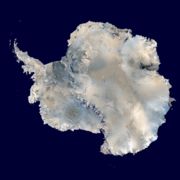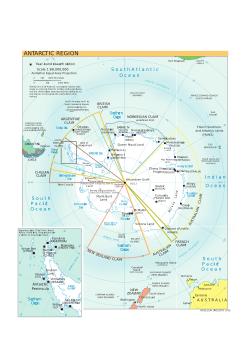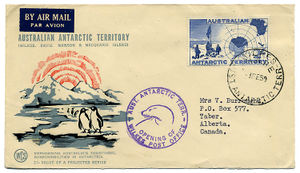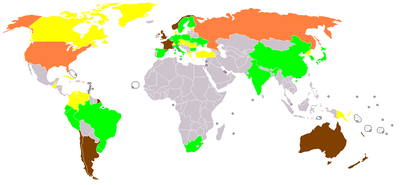Antarctic Treaty System
2008/9 Schools Wikipedia Selection. Related subjects: Antarctica
| International Ownership Treaties |
|---|
| Antarctic Treaty System |
| Law of the Sea |
| Outer Space Treaty |
| Moon Treaty |
| International waters |
| Extraterrestrial real estate |
The Antarctic Treaty and related agreements, collectively called the Antarctic Treaty System or ATS, regulate international relations with respect to Antarctica, Earth's only continent without a native human population. For the purposes of the treaty system, Antarctica is defined as all land and ice shelves south of 60°S latitude parallel. The treaty has now been signed by 46 countries, including the now-defunct Soviet Union, the United Kingdom, and the United States, and set aside Antarctica as a scientific preserve, established freedom of scientific investigation and banned military activity on that continent. This was the first arms control agreement established during the Cold War.
The Antarctic Treaty System
The (Main) Antarctic Treaty
The main treaty was opened for signature on December 1, 1959, and officially entered into force on June 23, 1961. The original signatories were the 12 countries active in Antarctica during the International Geophysical Year (IGY) of 1957-58 and willing to accept a US invitation to the conference at which the treaty was negotiated. These countries were Argentina, Australia, Belgium, Chile, France, Japan, New Zealand, Norway, South Africa, the USSR, the United Kingdom and the United States. Between them, the signatories had established over 50 Antarctic stations for the IGY. The treaty was a diplomatic expression of the operational and scientific cooperation that had been achieved on the ice.
Articles of the Antarctic Treaty
- Article 1 - area to be used for peaceful purposes only; military activity, such as weapons testing, is prohibited, but military personnel and equipment may be used for scientific research or any other peaceful purpose;
- Article 2 - freedom of scientific investigation and cooperation shall continue;
- Article 3 - free exchange of information and personnel in cooperation with the United Nations and other international agencies;
- Article 4 - does not recognize, dispute, or establish territorial sovereignty claims and no new claims shall be asserted while the treaty is in force;
- Article 5 - prohibits nuclear explosions or disposal of radioactive wastes;
- Article 6 - includes under the treaty all land and ice shelves south of 60 degrees 00 minutes south;
- Article 7 - treaty-state observers have free access, including aerial observation, to any area and may inspect all stations, installations, and equipment; advance notice of all activities and of the introduction of military personnel must be given;
- Article 8 - allows for jurisdiction over observers and scientists by their own states;
- Article 9 - frequent consultative meetings take place among member nations;
- Article 10 - treaty states will discourage activities by any country in Antarctica that are contrary to the treaty;
- Article 11 - disputes to be settled peacefully by the parties concerned or, ultimately, by the International Court of Justice;
- Articles 12, 13, 14 - deal with upholding, interpreting, and amending the treaty among involved nations.
The main objective of the ATS is to ensure in the interests of all mankind that Antarctica shall continue forever to be used exclusively for peaceful purposes and shall not become the scene or object of international discord. The treaty forbids any measures of a military nature, but not the presence of military personnel per se. It avoided addressing the question of existing territorial claims asserted by some nations and not recognized by others. According to article 25, the treaty may be modified or amended in any way after having been in force for fifty years (in 2011). Such changes will have to get a 3/4 majority vote.
Other agreements
Other agreements - some 200 recommendations adopted at treaty consultative meetings and ratified by governments - include:
- Agreed Measures for the Conservation of Antarctic Fauna and Flora (1964) (entered into force in 1982)
- The Convention for the Conservation of Antarctic Seals (1972)
- The Convention for the Conservation of Antarctic Marine Living Resources (1980)
- The Convention on the Regulation of Antarctic Mineral Resource Activities (1988) (although it was signed in 1988, it was subsequently rejected and never entered into force)
- The Protocol on Environmental Protection to the Antarctic Treaty was signed 4 October 1991 and entered into force 14 January 1998; this agreement prevents development and provides for the protection of the Antarctic environment through five specific annexes on marine pollution, fauna and flora, environmental impact assessments, waste management, and protected areas. It prohibits all activities relating to mineral resources except scientific. A sixth annex - on liability arising from environmental emergencies - was adopted in 2005 but is yet to enter into force.
Meetings
The Antarctic Treaty System's yearly Antarctic Treaty Consultative Meetings (ATCM) are the international forum for the administration and management of the region. Only 28 of the 46 parties to the agreements have the right to participate in decision-making at these meetings, though the other 18 are still allowed to attend. The decision-making participants are the Consultative Parties and, in addition to the 12 original signatories, include 16 countries that have demonstrated their interest in Antarctica by carrying out substantial scientific activity there.
Members
Note: The table can be sorted alphabetically or chronologically using the ![]() icon.
icon.
| Country | Original signatory | Consultative | Acceding |
|---|---|---|---|
| 1961- 06-23 | |||
| 1961- 06-23 | |||
| 1987- 08-25 | |||
| 2006- 12-27 | |||
| 1960- 07-26 | |||
| 1983- 09-12 | 1975- 05-16 | ||
| 1998- 05-25 | 1978- 09-11 | ||
| 1988- 05-04 | |||
| 1961- 06-23 | |||
| 1985- 10-07 | 1983- 06-08 | ||
| 1989- 01-31 | |||
| 1984- 08-16 | |||
| 1962- 06-14 | |||
| 1965- 05-20 | |||
| 1990- 11-19 | 1987- 09-15 | ||
| 2001- 05-17 | |||
| 1989- 10-09 | 1984- 05-15 | ||
| 1960- 09-16 | |||
claim (rests since 1945) |
1981- 03-03 1987- 10-05 |
1979- 02-05 1974- 11-19 |
|
| 1987- 01-08 | |||
| 1991- 07-31 | |||
| 1984- 01-27 | |||
| 1983- 09-12 | 1983- 08-19 | ||
| 1987- 10-05 | 1981- 03-18 | ||
| 1960- 08-04 | |||
| 1990- 11-19 | 1967- 03-30 | ||
| 1960- 11-01 | |||
| 1987- 01-21 | |||
| 1960- 08-24 | |||
| 1981- 03-16 | |||
| 1989- 10-09 | 1981- 04-10 | ||
| 1977- 07-29 | 1961- 06-08 | ||
| 1971- 09-15 | |||
| 1960- 11-02 | |||
| 1962- 06-14 | |||
| 1960- 06-21 | |||
| 1989- 10-09 | 1986- 11-28 | ||
| 1988- 09-21 | 1982- 03-31 | ||
| 1988- 09-21 | 1984- 03-24 | ||
| 1990- 11-15 | |||
| 1996- 01-25 | |||
| 2004- 05-27 | 1992- 10-28 | ||
| 1960- 05-31 | |||
| 1960- 08-18 | |||
| 1985- 10-07 | 1980- 01-11 | ||
| 1999- 05-24 | |||
* Claims overlap.
** Reserved the right to claim areas.
Currently, there are 46 treaty member nations: 28 consultative and 18 acceding. Consultative (voting) members include the seven nations that claim portions of Antarctica as national territory. The 21 non-claimant nations either do not recognize the claims of others, or have not stated their positions.
Antarctic Treaty Secretariat
The Antarctic Treaty Secretariat was established in Buenos Aires, Argentina in September 2004 by the Antarctic Treaty Consultative Meeting (ATCM).
The tasks of the Antarctic Treaty Secretariat can be divided into the following areas:
- Supporting the annual Antarctic Treaty Consultative Meeting (ATCM) and the meeting of the Committee for Environmental Protection (CEP).
- Facilitating the exchange of information between the Parties required in the Treaty and the Environment Protocol.
- Collecting, storing, arranging and publishing the documents of the ATCM.
- Providing and disseminating public information about the Antarctic Treaty system and Antarctic activities.
Legal system
Antarctica has no "permanent population" and hence no citizenship or government. All personnel present on Antarctica at any time are citizens or nationals of some sovereignty outside of Antarctica, as there is no Antarctic sovereignty. The majority of Antarctica is claimed by one or more countries, but most countries do not explicitly recognize those claims. The area on the mainland between 90 degrees west and 150 degrees west is the only land on Earth not claimed by any country.
Governments that are party to the Antarctic Treaty and its Protocol on Environmental Protection implement the articles of these agreements, and decisions taken under them, through national laws. These laws generally apply only to their own citizens, wherever they are in Antarctica, and serve to enforce the consensus decisions of the consultative parties: about which activities are acceptable, which areas require permits to enter, what processes of environmental impact assessment must proceed activities, and so on.
Argentina
According to Argentine regulations, any crime committed within 50 kilometers of any Argentine base is to be judged in Ushuaia (as capital of Tierra del Fuego, Antarctica, and South Atlantic Islands). In the part of Argentine Antarctica that is also claimed by Chile, the person to be judged can ask to be transferred there.
Australia
Since the designation of the Australian Antarctic Territory pre-dated the signing of the Antarctic Treaty, some of the complex suite of Australian laws that relate to Antarctica date from more than two decades before the Antarctic Treaty era. In terms of criminal law, the laws that apply to the Jervis Bay Territory (a non-contiguous part of the Australian Capital Territory) apply to the Australian Antarctic Territory. Key Australian legislation applying Antarctic Treaty System decisions include the Antarctic Treaty Act 1960, the Antarctic Treaty (Environment Protection) Act 1980 and the Antarctic Marine Living Resources Conservation Act 1981.
United States
The law of the United States, including certain criminal offenses by or against U.S. nationals, such as murder, may apply to areas not under jurisdiction of other countries. To this end, the United States now stations special deputy U.S. Marshals in Antarctica to provide a law enforcement presence.
Some U.S. laws directly apply to Antarctica. For example, the Antarctic Conservation Act, 16 U.S.C. section 2401 et seq., provides civil and criminal penalties for the following activities, unless authorized by regulation or statute:
- the taking of native Antarctic mammals or birds
- the introduction into Antarctica of non-indigenous plants and animals
- entry into specially protected or scientific areas
- the discharge or disposal of pollutants into Antarctica or Antarctic waters
- the importation into the U.S. of certain items from Antarctica
Violation of the Antarctic Conservation Act carries penalties of up to US$10,000 in fines and one year in prison. The Departments of Treasury, Commerce, Transportation, and Interior share enforcement responsibilities.
Public Law 95-541, the Antarctic Conservation Act of 1978, requires expeditions from the U.S. to Antarctica to notify, in advance, the Office of Oceans and Polar Affairs of the State Department, which reports such plans to other nations as required by the Antarctic Treaty.
A dispute which may test the criminal jurisdiction is presently in progress as a result of the death of Australian national Dr Rodney Marks in May 2000. Dr Marks died while wintering over at the American-run Amundsen-Scott South Pole Station (which is not on the geographic South Pole, but within the Ross Dependency claimed by New Zealand). Prior to autopsy, the death was attributed to natural causes by the National Science Foundation and the contractor administering the base. However, an autopsy in New Zealand revealed that Dr Marks died from methanol poisoning. The New Zealand Police launched an investigation. In 2006, frustrated by lack of progress, the Christchurch Coroner said that it was unlikely that Dr Marks ingested the methanol knowingly, although there is no certainty that he died as the direct result of the act of another person. During media interviews, the police detective in charge of the investigation criticized the National Science Foundation and contractor Raytheon for failing to co-operate with the investigation.
Further information is provided by the Office of Polar Programs of the National Science Foundation.



